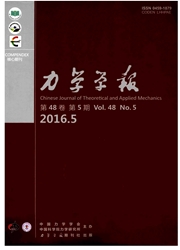

 中文摘要:
中文摘要:
微机电系统(micro-electro-mechanical system,MEMS)是指内部微结构尺寸在微米甚至纳米量级的微电子机械装置,是一个独立的智能系统。长宽厚均处于微米量级的微平板为MEMS中的典型结构,其声学和力学特性直接影响MEMS的性能。针对同时受声压激励和气膜力(通过考虑相同尺寸微平板振动引入)作用的四边简支微平板结构,应用Cosserat理论和Hamilton原理,建立了考虑微尺度效应(本征长度和Knudsen数)影响的声振耦合理论模型,并通过多重Fourier展开法求解了耦合方程,得到了系统的传声损失结果。通过频域分析,考虑微平板的不同振动频率、振动幅度和板间距,系统研究了不同尺度效应下微结构中气体薄膜所产生的阻尼力对微平板结构传声特性的影响。研究发现尺度效应对于微结构的声振特性影响巨大,振动行为对微结构的传声特性也有很大影响,控制并减小微平板的振动幅度以及增大微平板的间距都能够提高微平板的声振性能。研究结果为MEMS中微平板的稳定性优化设计提供了理论参考。
 英文摘要:
英文摘要:
Micro electromechanical system (MEMS) is an electromechanical device of microscale, in which micro-plate is the most typical structure. Its acoustical and mechanical properties influence the design of MEMS significantly. The vibroacoustic performance of simply supported micro-plate subjected to simultaneous stimulation of sound pressure and gas film (squeeze film) damping force is analyzed theoretically, the latter induced by the vibration of a micro-plate having similar size. By applying the Cosserat theory and the Hamilton principle, micro scale effects due to characteristic length and Knudsen number are taken into account. The governing equations are subsequently solved using the method of multiple Fourier transform to quantify sound transmission loss (STL) across the micro-plate. In the frequency domain, the effects of squeeze film under different circumstances (e.g., different characteristic lengths and Knudsen numbers, different vibration frequencies and amplitudes) on STL are investigated systematically. This work demonstrates the great influence of micro-scale effects, as well as vibration, on STL. Decreasing the vibration amplitude and increasing the distance between micro-plates lead to better performance of sound transmission. Results presented in this study provide useful theoretical guidance to the practical design of micro-plates in MEMS.
 同期刊论文项目
同期刊论文项目
 同项目期刊论文
同项目期刊论文
 Fracture of thermal barrier coating with multiple surface cracks and delaminations:Interlayer effect
Fracture of thermal barrier coating with multiple surface cracks and delaminations:Interlayer effect 期刊信息
期刊信息
